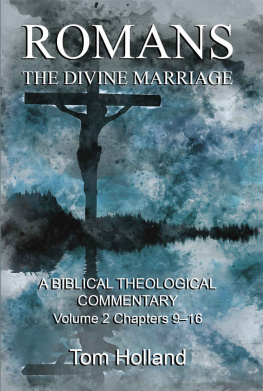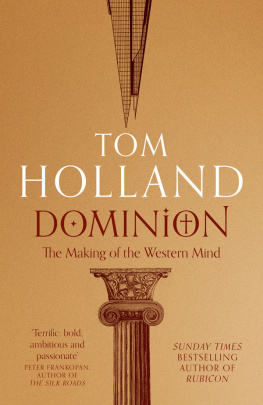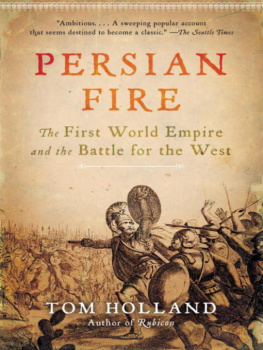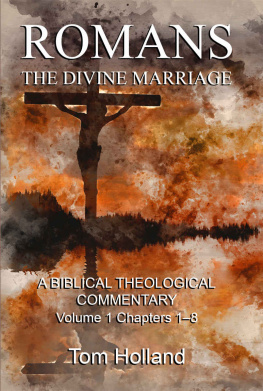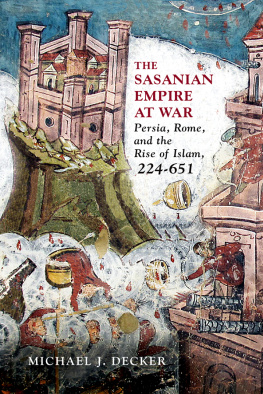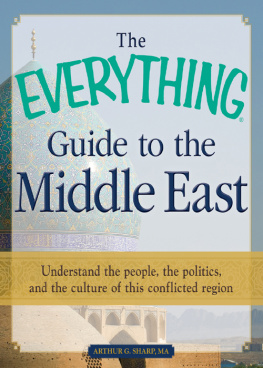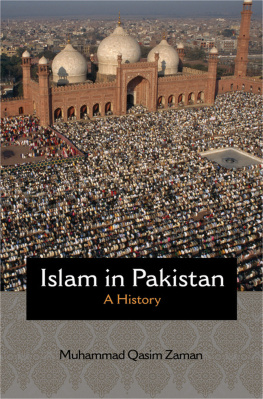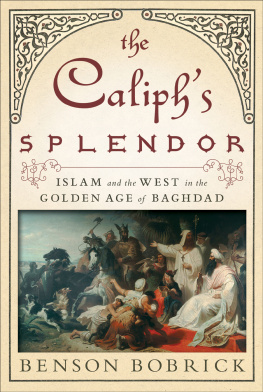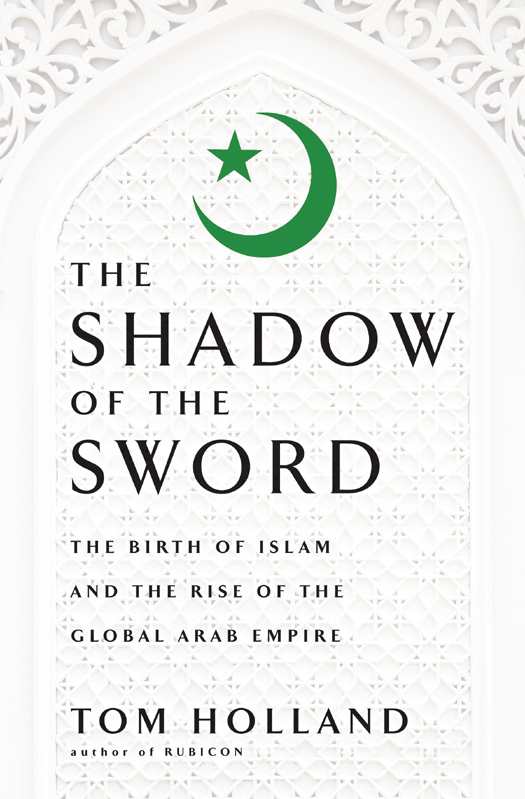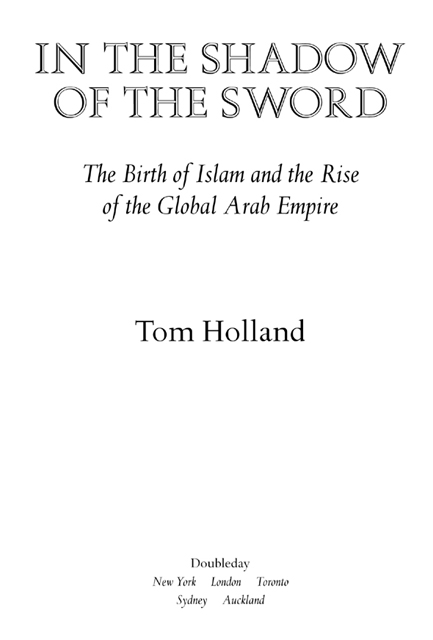Also by Tom Holland
The Forge of Christendom:
The End of Days and the Epic Rise of the West
Rubicon:
The Triumph and Tragedy of the Roman Republic
Persian Fire:
The First World Empire and the Battle for the West

Copyright 2012 by Tom Holland
All rights reserved. Published in the United States by Doubleday, a division of Random House, Inc., New York, and in Canada by Random House of Canada Limited, Toronto.
www.doubleday.com
Originally published in Great Britain by Little, Brown, a division of Hachette U.K., London.
DOUBLEDAY and the portrayal of an anchor with a dolphin are registered trademarks of Random House, Inc.
Cover design by Michael J. Windsor
Library of Congress Cataloging-in-Publication Data
Holland, Tom.
In the shadow of the sword : the birth of Islam and the rise of the global Arab empire / Tom Holland.1st U.S. ed.
p. cm.
Includes bibliographical references and index.
1. Islamic EmpireHistory. 2. IslamHistory. I. Title.
DS36.85.H65 2012
956.013dc23
2012000207
eISBN: 978-0-385-53136-8
v3.1
To Hillos
In memoriam
Contents
Acknowledgements
This is a book that has taken me a horribly long time to complete, and opened my eyes to entire realms of complexity and fascination that I had little idea existed when I first embarked upon the project. The debts of gratitude that I owe are correspondingly immense. Firstly, to my editor, Richard Beswick; to Iain Hunt, Susan de Soissons, and everyone at Little, Brown; to Gerry Howard; to Teresa Lwe-Bahners; and to Frits van der Meij. My thanks as well to that best of agents, Patrick Walsh, and to everyone at Conville and Walsh. Whether as a pygmy standing on the shoulders of giants, or as a fool rushing in where angels fear to tread, I owe a particular due to the scholars who have helped me to negotiate a field of historical study that is, perhaps, more interestingly seeded with landmines than any other. Reza Aslan, James Carleton Paget, Patricia Crone, Vesta Curtis, Gerald Hawting, Robert Irwin, Christopher Kelly, Hugh Kennedy, Dan Madigan, Ziauddin Sardar, Guy Stroumsa and Bryan Ward-Perkins all read parts or the whole of the first draftwith responses as varied as their kindness and generosity were unfailing. I am grateful as well to Fred Donner and Robert Hoyland for allowing me to pick their brains in private conversations, and to Robin Lane Fox for stiffening my backbone at a time when I was first waking up to the full scale of the challenge I had taken on. Like an infinitely greater historian than myself, I must profess my total ignorance of the Oriental tongues, and my gratitude to the learned interpreters, who have transfused their science into the Latin, French, and English languages. Translations from Arabic and Syriac were done for me by Salam Rassi, in whom prodigious learning goes hand in glove with remarkable patience and efficiency. Andrea Wulf, as ever, made good my lamentable lack of German. Last but not last, I must thank friends and family for putting up with five years of crazed mutterings about Hephthalites, Chalcedonians and Kharijites. Particular thanks, as ever, to Jamie Muir, for all his unstinting support, encouragement and advice; to Kevin Sim, who provided such a close and brilliant reading of the manuscript that he somehow managed to extract a film from it, and is now the person I automatically turn to whenever my desire to discuss Umayyad coinage becomes uncontrollable; and, of course, last but very much not least, to my beloved familySadie, Katy and Eliza.
Maps
The World of Late Antiquity
Iranshahr
The Roman Empire
Constantinople
Jerusalem
Holy Land
Arabia
Justinians Empire
Early Arab Conquests
The Caliphate Under the Umayyads
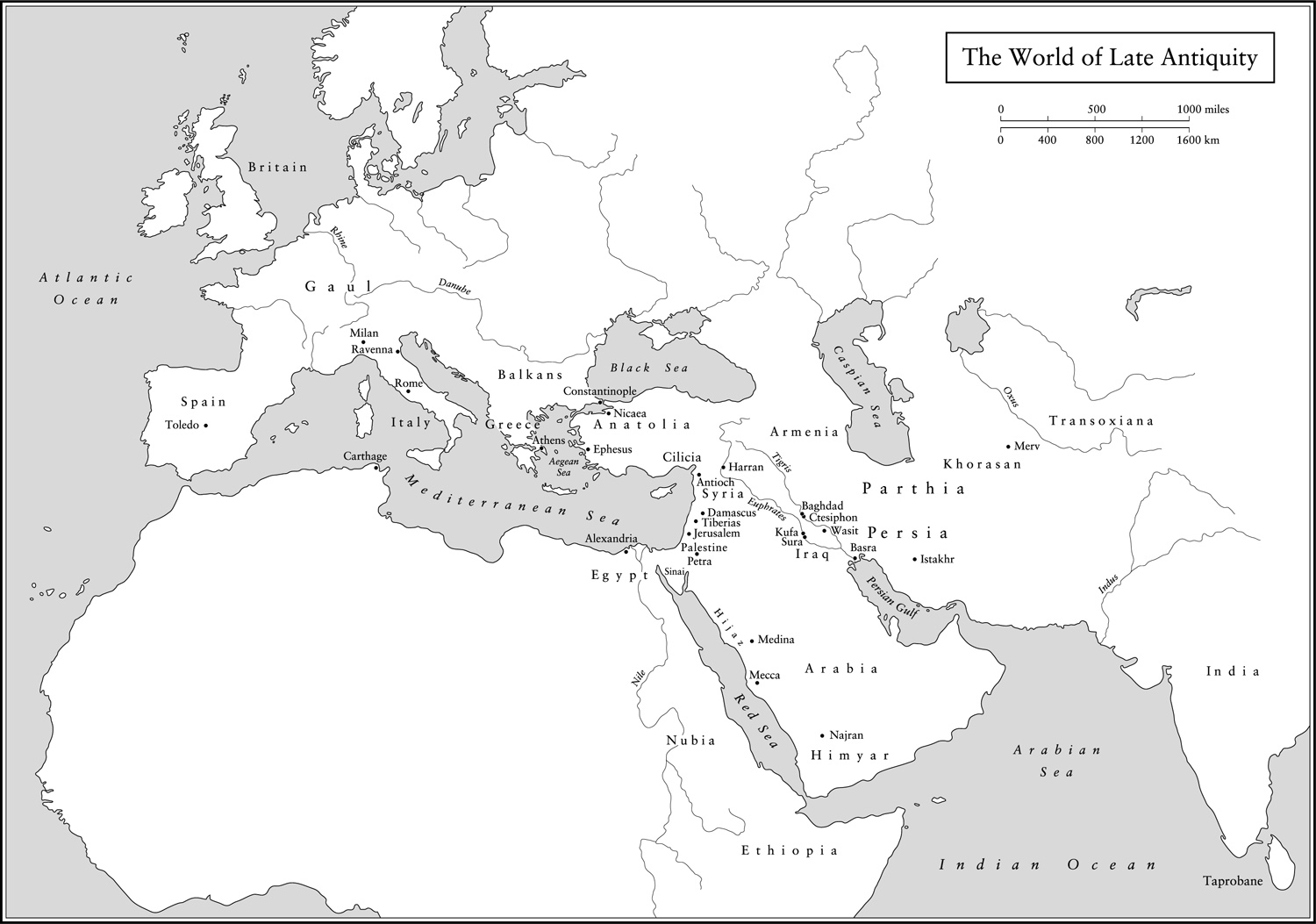
Do not look for a fight with the enemy. Beg God for peace and security. But if you do end up facing the enemy, then show endurance, and remember that the gates of Paradise lie in the shadow of the sword.
Saying of Muhammad, as recorded by Salih Muslim
I
INTRODUCTION
I shall include in my narrative only those things by which first we ourselves, then later generations, may benefit.
Eusebius, The History of the Church
The degree of authority one can give to the evangelists about the life of Christ is relatively small. Whereas for the life of Muhammad, we know everything more or less. We know where he lived, what his economic situation was, who he fell in love with. We know a great deal about the political circumstances and the socio-economic circumstances of the time.
Salman Rushdie
1
KNOWN UNKNOWNS
Between Two Worlds
Yusuf Asar Yathar, an Arab king celebrated for his long hair, his piety and his utter ruthlessness, had been brought to defeat. Leaving the reek of the battlefield, he rode his blood-flecked white charger down to the very edge of the Red Sea. Behind him, he knew, Christian outliers would already be advancing against his palaceto seize his treasury, to capture his queen. Certainly, his conquerors had no cause to show him mercy. Few were more notorious among the Christians than Yusuf. Two years previously, looking to secure the south-west of Arabia for his own faith, he had captured their regional stronghold of ordered her daughter and granddaughter killed before her, their blood poured down her throat, and then her own head to be sent flying.
Martyrdoms such as these, fted though they were by the Church, could not readily be forgiven. A great army, crossing from the Christian kingdom of Ethiopia, had duly landed in Himyar. The defenders had been cornered, engaged and routed. Now, with the shallows of the Red Sea lapping at his horses hooves, Yusuf had come to the end of the road. Not all his obedience to the laws granted to Gods chosen prophet had been sufficient to save him from ruin. Slowly, he urged his horse forwards, breasting the water, until at last, weighed down by his armour, he disappeared beneath the waves. So perished Yusuf Asar Yathar: the last Jewish king ever to rule in Arabia.
The collapse of the kingdom of the Himyarites in AD 525 is not, it is fair to say, one of the more celebrated episodes of ancient history. Himyar itself, despite having prospered for some six centuries until its final overthrow under Yusuf, lacks the ready brand recognition today of a Babylon, or an Athens, or a Rome. Unsurprisingly so, perhaps: for southern Arabia, then as now, was firmly peripheral to the major centres of civilisation. Even the Arabs themselves, whom the peoples of more settled lands tended to dismiss as notorious brutesof all the nations of the earth, the most despised and insignificant Behaviour that clearly branded them as beyond the pale.
Yet, it is not only in terms of its geography that Himyar seems to lie in shadow. Similarly obscure is the period in which the death of Yusuf occurred. The sixth century AD defies precise categorisation. It seems to stand between two ages. If it looks back to the world of classical civilisation, then so also does it look forward to the world of the Crusades. Historians categorise it, and the centuries either side of it, as late antiquity: a phrase that conveys a sense of lengthening shadows, and the Middle Ages soon to come.


